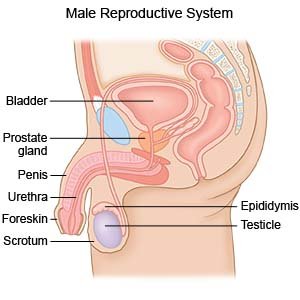Retropubic Prostatectomy
Medically reviewed by Drugs.com. Last updated on Aug 4, 2025.
A retropubic prostatectomy is surgery to remove your prostate gland.
 |
DISCHARGE INSTRUCTIONS:
Call your local emergency number (911 in the US) if:
- You have new trouble moving your legs.
- You suddenly feel lightheaded and short of breath.
- You have chest pain when you take a deep breath or cough. You may cough up blood.
Call your doctor or surgeon if:
- Your arm or leg feels warm, tender, and painful. It may look swollen and red.
- You have pain in your lower abdomen or pelvic area that does not go away even after you take pain medicine.
- Blood soaks through your bandage.
- You are leaking more urine than usual.
- You have a fever.
- You cannot control your bowel movements.
- You cannot get an erection.
- You have bright red blood in your urine, or your urine is cloudy and smells bad.
- Your surgery wound is red, swollen, or has pus coming from it.
- Your urine stream becomes slower than normal, or you are urinating only small amounts.
- You have questions or concerns about your condition or care.
Medicines:
- Prescription pain medicine may be given. Ask your healthcare provider how to take this medicine safely. Some prescription pain medicines contain acetaminophen. Do not take other medicines that contain acetaminophen without talking to your healthcare provider. Too much acetaminophen may cause liver damage. Prescription pain medicine may cause constipation. Ask your healthcare provider how to prevent or treat constipation.
- Take your medicine as directed. Contact your healthcare provider if you think your medicine is not helping or if you have side effects. Tell your provider if you are allergic to any medicine. Keep a list of the medicines, vitamins, and herbs you take. Include the amounts, and when and why you take them. Bring the list or the pill bottles to follow-up visits. Carry your medicine list with you in case of an emergency.
Related medications
Foley catheter care:
Keep the bag below your waist. If the bag is too high, urine will flow back into your bladder. This can cause an infection. Do not pull on the catheter. This may cause pain and bleeding, and the catheter may come out. Do not let the catheter tubing kink or twist. A kink or twist will block the flow of urine.
Bladder control:
After surgery, you may leak urine and have trouble controlling when you urinate. Ask for more information about the following ways to help decrease urine leakage:
- Avoid caffeine. It can cause problems with bladder control and increase your need to urinate.
- Do pelvic floor muscle exercises. They may help improve your bladder control. These exercises are done by tightening and relaxing your pelvic muscles. Ask how to do pelvic floor muscle exercises, and how often to do them.
- Limit your liquid intake. Drink smaller amounts of liquid throughout the day. Do not drink before bedtime. Ask if you should decrease the amount of liquid you drink each day. This may help you control your bladder.
- Wear a pad or adult diapers. These may help absorb leaking urine and decrease odor.
Bowel control:
After surgery, you may have trouble controlling when you have a bowel movement. You may regain control of your bowel movements over time. Ask what you can do to increase control and decrease the risk for leaks.
Follow up with your doctor or surgeon as directed:
You may need to return to have your Foley catheter removed. You may need to return to have blood tests or to have your prostate checked. Write down your questions so you remember to ask them during your visits.
© Copyright Merative 2025 Information is for End User's use only and may not be sold, redistributed or otherwise used for commercial purposes.
The above information is an educational aid only. It is not intended as medical advice for individual conditions or treatments. Talk to your doctor, nurse or pharmacist before following any medical regimen to see if it is safe and effective for you.
Further information
Always consult your healthcare provider to ensure the information displayed on this page applies to your personal circumstances.
